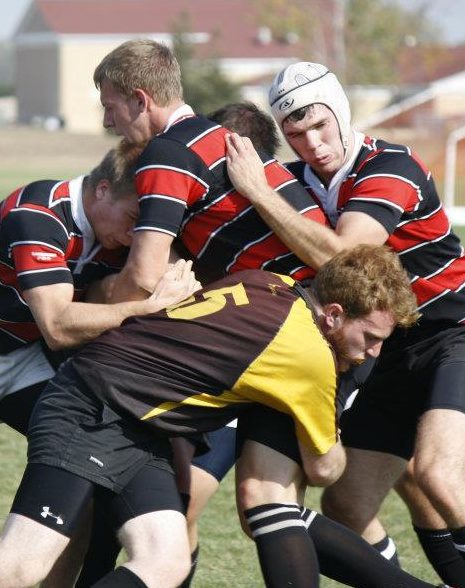While club sports often lack funding, paid coaches, and access to the same benefits that varsity sports receive, they are not lacking in spirit or skills.
For athletes who aren’t drawn to any of Gustavus’ varsity sports, club teams can satisfy their competitive tendencies. Two of the most popular club sports, ultimate frisbee and rugby draw in students from all different parts of campus.
“[Ultimate risbee] attracts people from all different kinds of groups. I think it is really cool to have something in common with a bunch of different people. I like getting to see the new players to start to learn and appreciate the sport, when everyone starts having fun you know you’re doing it right,” Women’s ultimate frisbee Captain Anna Nelson said.
In describing ultimate frisbee, one could say it is a mixture of football and soccer, except with a disc instead of a ball. There are seven people from each team playing at a time and the goal is to get the disc into the end zone. Due to its hybrid nature, ultimate frisbee attracts athletes from a wide variety of sports.
“I played [ultimate frisbee] in high school where it was a club sport. I joined the team after I decided to quit soccer and wanted to remain being involved in something athletic,” Nelson said.
This same sentiment goes for Women’s Rugby Captain Pia Richardson.
“Rugby didn’t exist where I was from. I was actually planning on joining the soccer team, but I was sick for tryouts. I still wanted to participate in a sport, so I ended up picking rugby because they had the biggest poster, and I don’t regret that decision at all,” Richardson said.
In reflecting on many of the other ladies on the team, Richardson explains that most were initially planning on playing a varsity sport, but realized that it just wasn’t for them. Because club sports often lack the resources that NCAA sports receive, the team has to work harder to keep the sport alive.
“We are second priority to NCAA for reserving Lund facilities, but it is nice to have the freedom to create our own schedule, planning games, and choosing which tournaments we want to go to. We also have to manage our own money, which creates unity among the team,” Richardson said.
In discussing the more difficult aspects of being in a club sport, Nelson cites similar issues.
“The lack of school funding, as well as the intensity of the sport makes things challenging. Finding coaches is hard and we practice at off times because varsity and IM sports get priority,” Nelson said.
While lacking school funds can make participation in a club sport stressful at times, it can also bring a team closer together. In discussing men’s rugby, Forward Hayden Goldstien brings up how the team bonds over their love of the sport.
“We’re all there because we love rugby, not because we love the flashiness of it. We just have a field and 15 guys. We’re there to play an amazing sport and enjoy our time together. Staying at crappy hotels and eating crappy food creates a lot of great memories and ensures you’re there for the right reasons,” Goldstien said.
Team bonding is a natural part of any sport, but is especially important amongst teams that are based off of dedication to the sport in order to keep it going.
“We all care about each other and are actually involved in each other’s lives outside of ultimate; we have a connection outside of the sport. We also have a good relationship with the men’s team, occasionally practice together. Everyone knows everyone,” Nelson said.
In addition to having strong bonds, many of the club teams possess great talent.
“Women’s rugby is the only DII sport at Gustavus, playing bigger schools such as NDSU. Leagues and classifications are usually based on size, but an exception was made for us because of the exceptional talent on the team,” Richardson said.
One example of this exceptional talent is Kaelene Lunde (‘10), who is currently training for the U.S. Olympic women’s rugby team.
Club sports at Gustavus, while small, are not lacking in potential. Hardworking and dedicated students create endless opportunities both for individual players, as well as the team as a whole.
